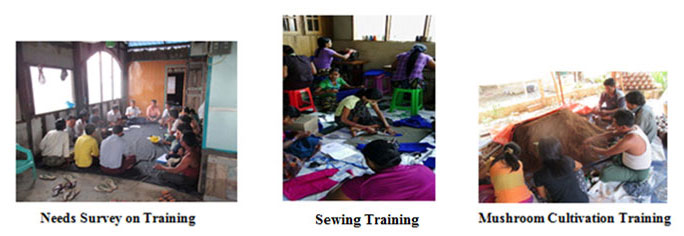Since June 2014, IRP activities have been undertaken on an ongoing basis including through a series of participatory workshops with Project Affected Peoples (PAPs), the Government of Myanmar (GoM), civil society organisations and resource people, to identify priority actions for livelihood restoration.
Issuing/Reissuing National Registration Card (NRC)
Many PAPs had lost NRCs when resettlement program was implemented. Without NRCs, people were not able to transfer children to new school, to open bank account, to travel around legally and to make other official procedure in daily life. IRPISC supported to issue/ reissue NRC for all PAPs in collaboration with Ministry of Labor, Immigration and Population.
Transferring School Children to New School
Concerning PAHs who were relocated to the relocation site, 23 children had to be transferred to new school near by relocation site. 21 out of 23 children were transferred to new school by June, 2014(new semester for schooling) by supporting of TSEZMC and Ministry of Education. 98 % of families whom children are going to school expressed satisfaction to school. The rest of 2 children were not transferred because of family affairs. As of Aug, 2016, 35 out of 38 children are attending school.
Vocational Training and Job Matching
(1) Vocational Training
Training has been provided to PAPs to improve their skills and job prospects. PAPs have participated in consultation meetings with local Civil Society Organizations (CSOs) to consider the type of training appropriate for identified future income generating activities. Local CSOs have also conducted training needs surveys and assessed training proposals from PAPs.
Since the completion of the initial vocational training program (January -June 2014), PAPs have taken the lead in identifying the training required and proposing the training location. A daily allowance for attending training has also been provided.
In summary, the IRP has provided a wide range of vocational training including: basic arithmetic training; driver training; security guard training; tailoring (sewing) training; language skill training (English, Japanese); computer skill training; and electricity installation.
Some training activities have been directly supported by Myanmar Japan Thilawa Development (MJTD) and also by the Japanese vocational training organisation based at the SEZ: Fuji Work. They have included site visits to factories operating within the SEZ such as Cute Myanmar Thilawa Co., Ltd, which produces soft toys.

(2) Job Matching Support
Following the development of the SEZ area, businesses that have taken leases within the SEZ, and construction companies working within the SEZ, have commenced recruiting local workers to work at the SEZ. The IRP has supported PAPs to prepare Curriculum Vitaes (CVs) and has coordinated job interviews for them, working in close coordination with Myanmar Japan Thilawa Development Limited (MJTD), the developer of the Thilawa SEZ, and the Yangon Regional Government (YRG). The IRP has been tracking the progress of PAPs that have expressed interest in working at the SEZ and those that have secured jobs.25 PAPs are working in SEZ as of the end of August, 2016. 16 people have applied job in SEZ and are waiting for taking interview which will be held in Oct, 2016.

Communication flow for Job Matching
(3) Site Tour at Thilawa SEZ
 Since the Thilawa SEZ commenced operations in late 2015, a number of businesses have commenced activities. Site tours have been organized for PAPs to learn more about the SEZ development and the type of work likely to be available.45 PAPs participated in this tour.
Since the Thilawa SEZ commenced operations in late 2015, a number of businesses have commenced activities. Site tours have been organized for PAPs to learn more about the SEZ development and the type of work likely to be available.45 PAPs participated in this tour.
Micro Finance Program
In March 2015, a community-based micro finance program commenced as an additional measure to support PAPs in developing stable livelihoods. A local microfinance program expert and local civil society group Shwe Hmaw Wun worked with PAPs to implement the program.
Infrastructure Improvement at the Relocation Site
In 2014, at the end of the rainy season, flooding and fresh water supply problems occurred in the SEZ relocation area. In response, TSMC surveyed the ground level and condition of each house and collected information from residents about the drainage and other relevant details. The JICA Expert Team proposed a plan for technical infrastructure improvement at the Relocation Site (RS). A series of workshops and meetings were conducted with residents. Based on their requirements and the survey results, three infrastructure improvement projects were identified: upgrading of houses; upgrading and cleaning of existing wells; and construction of a new culvert at the creek. These projects were implemented. In addition, four hand water pumps were upgraded and replaced.
 |
||
|
Upgrading and Cleaning of existing wells |
Upgrading of houses | Construction of a new culvert at the creek |
Social Welfare Support Program
Following the findings of the first external monitoring and evaluation review in late 2014, a transitional allowance for PAPs was proposed, as an additional measure of support for PAPs in restoring their livelihoods. The supplementary program was named the Social Welfare Support Program (SWSP).
Transitional allowances such as the SWSP are common in land acquisition and resettlement programs. Such allowances are generally separate to compensation. They are supplementary ‘support measures’ – provided in cash or as in-kind support – and are consistent with international good practice. In the case of the IRP, payments were provided to bank accounts, not directly in cash.
The SWSP concept was discussed and designed with the input of civil society representatives and local trusted persons including religious leaders.
Support for all PAPs to Establish Bank Accounts.
Technical training for family account management has been implemented consistently since March 2015 to support PAPs in managing household finances.
Monitoring surveys and day-to-day observations have been conducted to assess how PAPs have used the SWSP to restore their livelihoods and reduce any debt.
